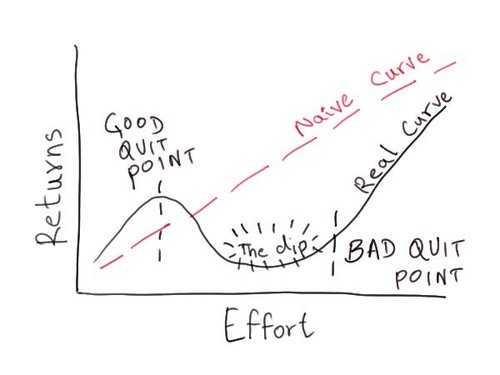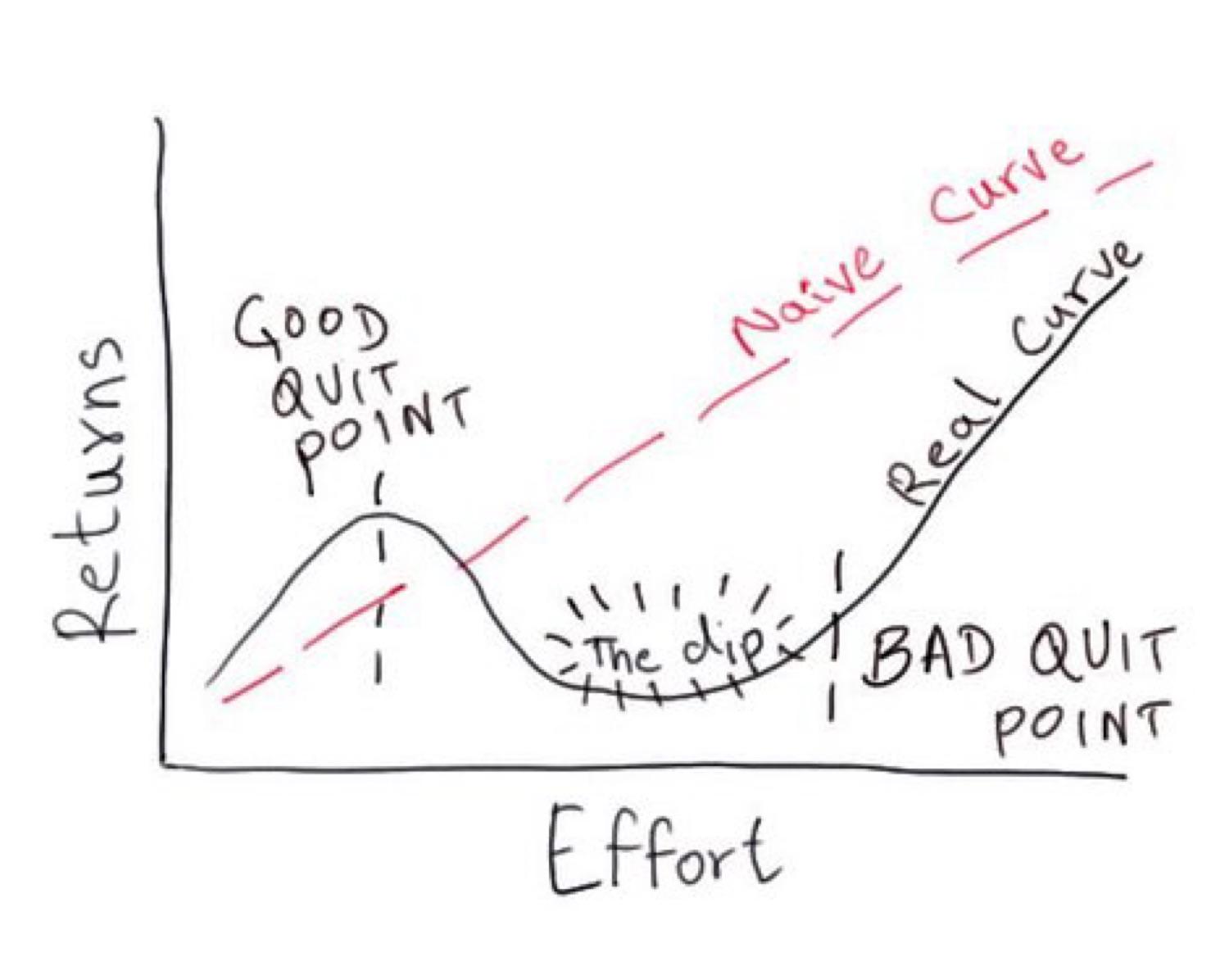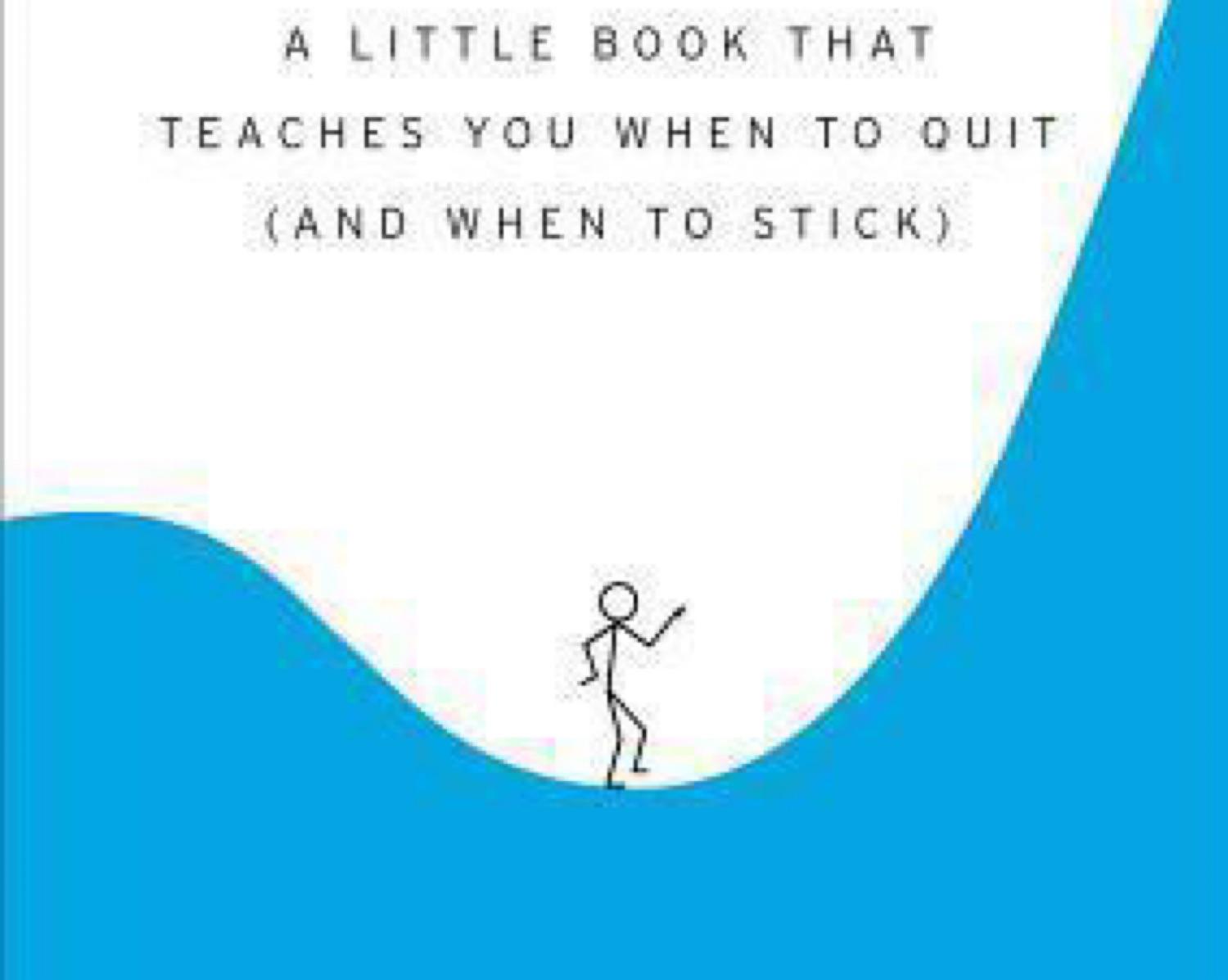When Quitting is Winning
Curated from: cyrious.com
Ideas, facts & insights covering these topics:
9 ideas
·3.62K reads
46
2
Explore the World's Best Ideas
Join today and uncover 100+ curated journeys from 50+ topics. Unlock access to our mobile app with extensive features.
Quitting Is A Point Along The Effort-Returns Curve. That’s All.
In The Dip: When To Quit (And When To Stick) Seth Godin argues that it isn’t hard work or dedication or good luck that brings success. It is quitting. Godin stresses that successful individuals and organizations are ones who are not afraid to quit, and who know what to quit and when to quit it.
54
752 reads
Neither Persevering Nor Quitting Are What They’re Hyped As
The Dip is a mind-changer, laying the ground work for a shift in how we look at perseverance and quitting. In it, Godin states that, “Most of the time, we deal with the obstacles by persevering. Sometimes we get discouraged and turn to inspirational writing, like stuff from Vince Lombardi: ‘Quitters never win and winners never quit.’ Bad advice. Winners quit all the time. They just quit the right stuff at the right time.”
53
513 reads
The Cul-de-Sac
Godin says that there are many people who would otherwise be considered a success if they weren’t spinning their wheels in what they believe they should stay doing. He says that sometimes, we commit ourselves to completing a project or staying with a company or relationship only to discover later that the situation has stagnated and there is no potential for real growth. This is what Godin calls a “Cul-de-Sac.”
49
441 reads
How To Deal With The Cul-de-Sac
Success lies in recognizing a situation or relationship as a Cul-de-Sac and not being afraid to quit when you do. All Cul-de-Sacs do is drain your energy and resources, diverting your attention away from making it through a worthwhile Dip.
The Takeaway: Identify the Cul-de-Sac. When the going gets tough, it is time to reexamine your goals and mission statement. It is time to study to find out if you are in a Cul-de-Sac or a Dip. You may find that yes, perseverance is required, or no, you should quit and go on to something better.
46
356 reads
The Dip
Godin describes the Dip as the long, hard period between beginning something new and finally mastering it. It’s after the excitement of those first beginning days has worn off and before the fulfillment of your dream. It is the point between starting something and excelling at it. Another way to look at it is the stretch from beginner to expert, or mile 20 in a marathon, or the realization that it takes time, effort, and skill to get better.
47
324 reads
How To Deal With The Dip
While the Dip may seem long and painful, the good news is that it’s actually a shortcut to success. The Dip weeds out the competition and is also is the point at which many give up. Those who survive the Dip receive the big rewards. Godin gives Stephen King, Starbucks, and Microsoft as examples.
The Takeaway: Endure the Dip. Godin states that the secret to dealing with the Dip is to figure out beforehand if you’re willing to see your project all the way through and if it’s worth doing. If you’re not willing or the pay-off isn’t big enough, quit before you enter the Dip.
49
327 reads
How Do You Tell Them Apart? Look For Waste Of Time Or Mediocrity
Sounds simple enough, right? We all have been in Cul-de-Sacs and some of us have made it through the Dips before. The key is to know what both look like so you are not wasting your time in the Cul-de-Sac when you think you are pushing through the Dip. But once the Dip is recognized, we need to give it our all to rise out of the Dip. That doesn’t always happen as Godin says, “Worse, when faced with the Dip, sometimes we don’t quit. Instead, we get mediocre.”
45
311 reads
What If That Doesn’t Work? Look For Lack Of Passion
According to Godin, the Dip is not always easy to spot. However, if you are passionate about being number one at something, you continue climbing until you reach the goal. That is busting through the Dip. If it is a Cul-de-Sac, Godin says you will know it based on the lack of passion you have in that task, job, or relationship.
46
304 reads
Sometimes Sticking Is Winning. Sometimes Quitting Is.
A final quote from Godin best sums up the need for learning about going through the Dip or just quitting: “I’d rather have you focus on quitting (or not quitting) as a go-up opportunity. It’s not about avoiding the humiliation of failure. Even more important, you can realize that quitting the stuff you don’t care about or the stuff you’re mediocre at or better yet quitting Cul-de-Sacs frees up your resources to obsess about the Dips that matter.”
45
295 reads
IDEAS CURATED BY
CURATOR'S NOTE
Who in their right mind would want to read a book about quitting? Why would anyone want to read a book about quitting? Well, here’s why.
“
Xarikleia 's ideas are part of this journey:
Learn more about strategy with this collection
The importance of innovation
The power of perseverance
How to think big and take risks
Related collections
Similar ideas
6 ideas
Quitting as a Productivity Habit
medium.com
9 ideas
Quit Already: 7 Ways To Know When It's Time To Cut Your Losses
blog.highperformancelifestyle.net
6 ideas
4 Ways to Learn Anything
inc.com
Read & Learn
20x Faster
without
deepstash
with
deepstash
with
deepstash
Personalized microlearning
—
100+ Learning Journeys
—
Access to 200,000+ ideas
—
Access to the mobile app
—
Unlimited idea saving
—
—
Unlimited history
—
—
Unlimited listening to ideas
—
—
Downloading & offline access
—
—
Supercharge your mind with one idea per day
Enter your email and spend 1 minute every day to learn something new.
I agree to receive email updates


